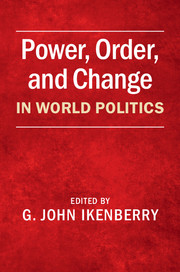Book contents
- Frontmatter
- Table of contents
- Contributors
- Acknowledgments
- Introduction: power, order, and change in world politics
- Part I Varieties of international order and strategies of rule
- Part II Power transition and the rise and decline of international order
- 4 Hegemonic decline and hegemonic war revisited
- 5 Gilpin approaches War and Change: a classical realist in structural drag
- 6 Order and change in world politics: the financial crisis and the breakdown of the US–China grand bargain
- Part III Systems change and global order
- Index
- References
5 - Gilpin approaches War and Change: a classical realist in structural drag
Published online by Cambridge University Press: 05 September 2014
- Frontmatter
- Table of contents
- Contributors
- Acknowledgments
- Introduction: power, order, and change in world politics
- Part I Varieties of international order and strategies of rule
- Part II Power transition and the rise and decline of international order
- 4 Hegemonic decline and hegemonic war revisited
- 5 Gilpin approaches War and Change: a classical realist in structural drag
- 6 Order and change in world politics: the financial crisis and the breakdown of the US–China grand bargain
- Part III Systems change and global order
- Index
- References
Summary
Introduction
Robert Gilpin’s War and Change in World Politics, flirting with its twentieth printing three decades after it was first published, is much more than a classic text dutifully absorbed by graduate students preparing for their comprehensive exams – it remains a work of enduring, theoretical insights that are immediately relevant for understanding contemporary international relations. Why does War and Change remain vital, for both scholars and statesmen, after all these years? A tempting and fashionable answer might be that as a deductive, structuralist argument, it is free from the minutiae of the current events of its day, or any day, and is thus timeless. And it is possible to read the book this way, encouraged by the author’s occasional resort to stentorian, deterministic prose (“it has always been thus and always will be,” p. 210). But in fact, War and Change endures in spite of its structuralism, not because of it. That structural machine, so carefully pieced together over the course of the volume, like many “deductive” frameworks proffered by scholars of international relations then and now, was in fact much rooted in (and shaped by) the transient concerns of its time – and it got those concerns wrong. War and Change was motivated by the late 1970s alarm about American decline in comparison with the “rising challenger” of the Soviet Union. These themes also inform the book’s incongruous epilogue, which concludes on a “cautiously optimistic note” that belies the inescapable (and compelling) pessimistic logic of the preceding chapters. Epilogue notwithstanding, the machine expected hegemonic war, and the machine was wrong.
- Type
- Chapter
- Information
- Power, Order, and Change in World Politics , pp. 131 - 161Publisher: Cambridge University PressPrint publication year: 2014
References
- 2
- Cited by



